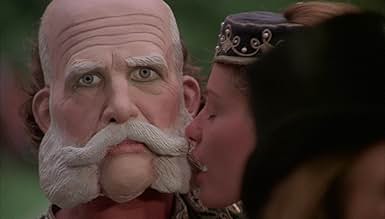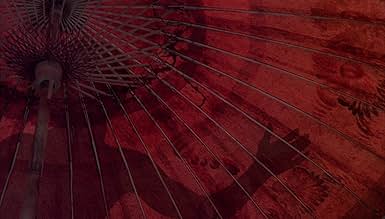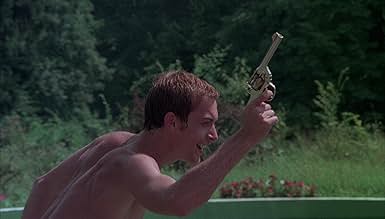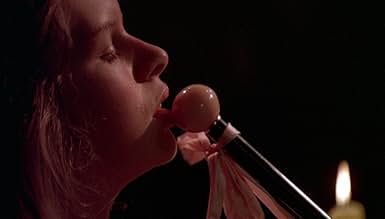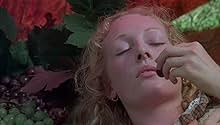अपनी भाषा में प्लॉट जोड़ेंPrince Rudolf, heir to the throne of the Austro-Hungarian Empire, deliberately provokes his father, Kaiser Franz Joseph, by his dissolute and feckless behaviour. His defiance of the Kaiser's... सभी पढ़ेंPrince Rudolf, heir to the throne of the Austro-Hungarian Empire, deliberately provokes his father, Kaiser Franz Joseph, by his dissolute and feckless behaviour. His defiance of the Kaiser's rigid adherence to duty and the good of the empire leads to a tragic confrontation betwee... सभी पढ़ेंPrince Rudolf, heir to the throne of the Austro-Hungarian Empire, deliberately provokes his father, Kaiser Franz Joseph, by his dissolute and feckless behaviour. His defiance of the Kaiser's rigid adherence to duty and the good of the empire leads to a tragic confrontation between power and hedonism at the Mayerling hunting lodge.
- पुरस्कार
- कुल 1 नामांकन
- Marie von Vetsera
- (as Therese Ann Savoy)
फ़ीचर्ड समीक्षाएं
This is a fascinating film which can be aligned for many reasons with Pasolini's Salo (they were both made almost in parallel). Both films are subversive historical studies of human sexuality and the treatment of the human body as a political object. Or more simply, the way bodies are always at the centre of the forces of power. The two films are very different - but not absolutely distinct. Both do concern the events at a distant place where sources of political and social power subvert the order of things. In Salo, however, it is an insatiable facistic power which reproduces itself through acts of abuse and murder. In Private Vice..., it is a subversive power of a less annihilistic order aiming to alter order by embracing passions and overturning the military order. Quite the opposite to Pasolini's much more bleak vision of politics in the shadow of modern forms of exploitation since WW2.
Private vice, Public Virtue follows a rebel son embracing the ideals of sexual freedom, dionysian joys such as wine and song, and the rebellious refusal to accept the orders of absent elders. The scenes where they mock the military ruler with caricatured masks as the army returns from battle is one such example. But throughout, the film seeks to alter roles and power structures. Women wield dildoes, nakedness is not the domain of women as in so many other films and sexual expression is an unstoppable force. The film is both a beautiful, utopian vision and a tale of the violent power of history.
I saw this film at Essex University in 1977 and have never had the chance to see it since.Where could I see this again?
I believe it is intrinsically unlikely that Franz-Joseph would have ever contemplated the assassination of his son, the heir to the Hapsburg throne, however acutely he had been embarrassed by his behaviour. After more than six centuries of continuous rule by the same family, the Hapsburg dynasty was almost unique; and throughout Franz Joseph's long life devotion to the continuation of this dynasty had been the major driving force for most of his activities. He had little respect for his brothers son, through whom the succession would pass, and it is recorded that he never once spoke to the great nephew who was his eventual successor during the remaining 27 years of his rule. He must have been aware that his death would constitute a major crisis which the empire itself might not survive; and it is hard to believe that, whatever the provocation, he would deliberately have done anything to create such a crisis. There are at least two other more credible explanations for the assassination of Crown Prince Rudolf. Over the centuries the Hapsburg empire had expanded, more by marriage than by conquest, until it incorporated a vast array of diverse ethnic groups which became difficult to hold together after the Napoleonic wars released their tide of libertarianism and nationalism. One revolt in Hungary was suppressed, but the Empress persuaded her husband to make a very conciliatory settlement with the Hungarians in 1867 which effectively created what became known as the joint Austro-Hungarian Empire. Rudolf was also strongly supportive of Hungarian aspirations, and this antagonised many members of the Imperial old school. Some of them may well have decided to take steps to ensure that Rudolf would never succeed Franz-Joseph as Emperor. An alternative explanation for his death is supported by near deathbed testimony from Countess Zita, the wife of Emperor Karl, Franz Joseph's eventual successor who inherited the imperial throne in 1916, following the assassination of his uncle in Sarajevo in 1914 and the death of the old Emperor during the resulting world war. Empress Zita lived to the age of almost 90, dying in 1989 fourteen years after this film was produced. Before her death she recorded accounts of Hapsburg family conversations which suggested that Rudolf's death followed an approach from French authorities seeking to gain his support for an attempt to persuade Franz Joseph to abdicate so that Rudolph could introduce a more liberal regime which internationally would support the French rather than Germany. Rudolf had indignantly rejected this proposition and reported it to his father. His assassination at Meyerling followed - presumably by French agents or their Austrian sympathisers. Her account was largely ignored at the time it was first published, but three years after her death (and several years after this film was released)it was supported by late autopsies of the bodies of the two victims which showed that, contrary to the official accounts, Baroness Vetsera had not been shot but had been battered to death, and that Rudolf had fired six shots from his revolver before he died. It is interesting to speculate how this new information might have changed the message Jancso was attempting to pass on, if it had been available when the film was produced.
We are now never likely to know what actually happened; but if, like me, you do not believe Franz Joseph was directly responsible for the death of his son, you can still enjoy this film and its message that the old order will eventually have to yield to the pressures created by a younger and more virile generation. It is an important film which should be made available as a DVD, but be aware that whilst the Rudolf of the film is just a libertine who is something of a caricature, the historical Crown Prince appears to have been a well travelled, cultivated individual with remarkably progressive views who was highly regarded by most of those that had anything to do with him.
क्या आपको पता है
- ट्रिवियाThis movie avoids any reference or mention of Crown Prince Rudolf's mother Empress Elisabeth, due to her near saint-like status in Hungary.
- क्रेज़ी क्रेडिटAfter the last on-screen credit, the camera follows the funeral procession, in slow motion, for a full minute.
- कनेक्शनReferenced in Rewind This! (2013)
- साउंडट्रैकBaa Baa Black Sheep
Traditional nursery rhyme
टॉप पसंद
- How long is Private Vices, Public Virtues?Alexa द्वारा संचालित
विवरण
- चलने की अवधि
- 1 घं 44 मि(104 min)
- ध्वनि मिश्रण
- पक्ष अनुपात
- 1.85 : 1

